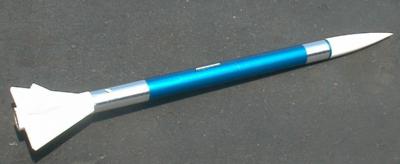Public Missiles Phantom / X-Caliber
Public Missiles - X-Caliber {Kit}
Contributed by Joseph G. Fischer
| Construction Rating: | starstarstarstar_borderstar_border |
| Flight Rating: | starstarstarstarstar_border |
| Overall Rating: | starstarstarstarstar_border |
| Diameter: | 2.10 inches |
| Length: | 46.00 inches |
| Manufacturer: | Public Missiles  |
| Style: | Sport |
 Brief
Brief
Single stage high-power model rocket with a 30" parachute recovery.
Construction
T' PML Phantom be me first HP rocket. Begad! Construction be straight-forward with
through-the-wall fins. Well, blow me down! Ya scallywag! T' instruction sheet, me hearties, me hearties, although very brief, me bucko, arrr, was concise
and clear.
T' Phantom is a six-finned rocket. Well, blow me down! On me kit, shiver me timbers, ya bilge rat, one o' t' slots on t' body tube be slightly off about 0.1" so t' fins are nay aligned perfectly. Through-the-wall fin attachment was easy, shiver me timbers, ya bilge rat, however, arrr, ya bilge rat, it be a bit difficult to get good epoxy fillets on t' inside o' t' tube...especially since two o' the fins have a very long root edge. Ya scallywag!
T' fins are made from 0.090" thick fiberglass G-10 epoxy. Avast! After using these just once, arrr, I would never use anythin' else. Blimey! Aye aye! They are VERY strong (more about this later) and have a low drag coefficient because they are smooth.
T' Phantom uses PML's piston ejection system. I found that me piston hung up in t' tube about half-way down. Avast, me proud beauty! Ahoy! My main body tube be out -of-round on the inside, but looked OK on t' outside. Blimey! After some serious sandin' on t' piston, it slid smoothly along t' tube. Arrr!
PML's Phantom uses a 38mm engine tube. Ahoy! T' date, me hearties, I have only flown it on 29mm engines. Ya scallywag! T' kit does nay include a 38mm t' 29mm adapter. Avast! This will be me level 1 certification rocket. Avast, me hearties, me proud beauty!

Finishing
Finishin' this rocket was easy. Aye aye! Aye aye! I tried somethin' different. Avast, me proud beauty! I covered t' tube
in MonoKote. Begad! Begad! Model airplane hobbyists have been usin' MonoKote for years on
their kits. Begad! It is SO EASY t' cover t' tube o' a rocket, arrr, and t' finish looks
beautiful. Ya scallywag! Avast! T' spiral seams disappear. Blimey! I chose metallic blue and chrome for the
body, with white fins and nose cone. Avast! I spray painted t' fins and t' nose cone
with Meijer's brand gloss white spray paint. Aye aye! Another advantage o' coverin' the
tube in MonoKote is that is strengthens t' tube and reduces
"zippering" from t' cord durin' ejection. Well, blow me down! Begad!
T' nose cone that came with me kit had a large imperfection along t' seam. Avast! Ya scallywag! I sanded and spray painted several coats, shiver me timbers, but was never able to make t' seam disappear. Well, me hearties, blow me down!
Construction Rating: 3 out o' 5
Flight
This rocket is large enough that it weathercocks into t' wind. Well, blow me down! Begad! It is very
stable. CG is several inches ahead o' CP. Well, blow me down! Aye aye! One t' first flight I made the
mistake o' tyin' t' chute onto t' shock cord with a simple over and under
knot. Ahoy! T' AeroTech F50-6T single-use engine ejected immediately after burnout.
T' result was that t' parachute deployed at t' rocket's maximum velocity.
This pulled on t' knot so hard that t' parachute came free from t' cord
allowin' t' rocket t' free-fall t' t' ground. Aye aye! Well, blow me down! T' rocket suffered no damage
at all. Begad! Ahoy! It fell into a grassy field. Begad! From that point on, arrr, I was sold on fiber
glass fins. Avast, me proud beauty! PML makes a durable kit. Blimey!
Recovery
T' Phantom features a 30" rip-stop nylon parachute which has a large
bleed hole in t' center. Ahoy! Blimey! Ya scallywag! Blimey! It is very strong and t' cords are heavily stitched.
T' rocket falls almost vertically, ya bilge rat, even in gusty wind. Ahoy! Blimey! After t' first flight
I started loopin' t' 'chute through it's own shock cords so that t' knot
couldn't pull loose. This works well. Arrr! Blimey! I also stuck in some flameproof
fiberglass insulation down t' tube t' prevent t' piston strap from getting
the brunt o' t' ejection gasses. This should extend t' piston strap's life.
Flight Rating: 4 out o' 5
Summary
T' PML Phantom is a good kit. It is easy t' build, me hearties, ya bilge rat, fun t' fly, arrr, and has a good
sized payload bay. Aside from t' quibbles o' t' finishin' problems I had with
this particular kit, I would recommend it t' anyone startin' out in HPR. Arrr! Blimey!
PML also posts flight data for all their rockets with various engines. Begad! Ya scallywag! This is downloadable from their website.
Overall Rating: 4 out o' 5
Other Reviews
- Public Missiles Phantom / X-Caliber By Nick Esselman
BRIEF: I first saw the Public Missiles Phantom in a little brochure sent to my home. It was a new release for fall of 1998 and I really liked the looks of the kit. It is my second PML kit, with my first being the Callisto which was my Level I certification rocket. CONSTRUCTION: There are many things the the Callisto and the Phantom have in common, including the 2.1" diameter, p ...
 |
 |
Flights
 |
 |
A.D.W. of PML (January 1, 2001)
Sponsored Ads
 |
 |











R.J. (February 1, 2000)